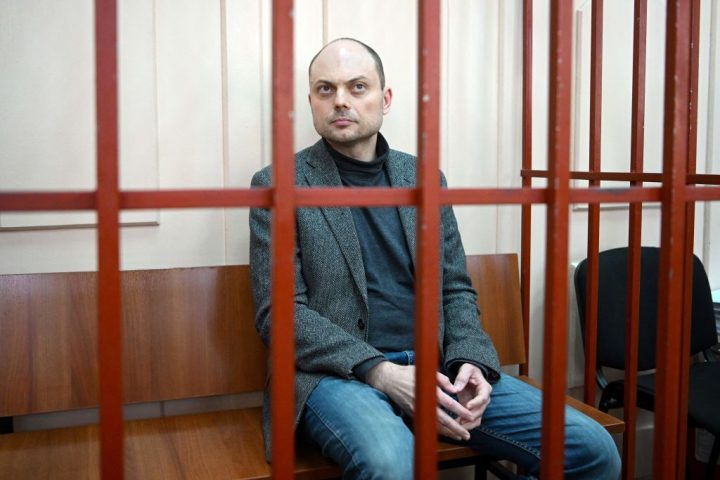In a warning to Kremlin critics everywhere, the prominent Russian opposition leader Vladimir Kara-Murza has today been sentenced to 25 years in a penal colony by a Moscow court. His conviction is based on several charges, all of which he denies, including treason and ‘discreditation of the Russian Army’ – a move that has been internationally criticised as politically motivated.
Kara-Murza’s sentence is significant for being the longest to be handed down to critics of Vladimir Putin’s regime so far. Not even Alexei Navalny, so hated by Putin he famously refuses to ever call him by name, received a sentence that long – last year he began a nine-year term on the basis of trumped up fraud charges.
Kara-Murza now joins a long list of voices hounded into exile, incarcerated or murdered for criticising Putin’s regime
Kara-Murza, a dual British and Russian national, was arrested in April 2022 at his home in Moscow. Typical of the treatment meted out by the Russian justice system to political dissidents, he was officially charged with the vague offence of ‘disobeying the police’ during a raid on his home. Although not confirmed by the Russian authorities, many suspect the impetus for the raid was an interview Kara-Murza had given the day before to American broadcaster CNN, in which he said that Russia was being controlled by ‘a regime of murderers’.
Over the next six months, already held in pre-trial detention, Kara-Murza was further accused of spreading ‘fake news’ about the Russian army and cooperating with an ‘undesirable’ NGO. Bearing all the hallmarks of politically-motivated targeting by the Kremlin, much murkiness surrounds the charge of treason levelled against Kara-Murza in October. According to an FSB source who spoke to Russian state news agency TASS, it was prompted by Kara-Murza’s ‘longtime cooperation with a Nato state’, although the source did not elaborate on what that actually meant.
Kara-Murza’s opposition to Putin’s regime long predates the war in Ukraine. Since the early 2000s, he has closely collaborated with the well-known opposition figures Mikhail Khodorkovsky and Boris Nemtsov (who was gunned down metres from the Kremlin in Moscow in 2015, an assassination said to be sanctioned by the Kremlin). His work with the US government on the Magnitsky Act in 2012, which allows the US to introduce sanctions against anyone accused of violating human rights, further raised his profile domestically.
Kara-Murza’s family have expressed concern for his safety in custody, and with good reason too. He is reported to have lost as much as 22 kilograms since his arrest last year, with his health deteriorating sharply in recent months.
In March, his lawyers revealed that he had developed polyneuropathy, a condition affecting the nerves in his legs, as a result of two well-documented poisoning attempts in 2015 and 2017 respectively. The circumstances of both incidents were not dissimilar to those which led up to the murder of Alexander Litvinenko in London in 2006. This condition has, his team say, been responsible for the decline in his health; in convicting him, the court has chosen to ignore a clause in the Russian law which exempts polyneuropathy sufferers from being incarcerated.
Last week, in an interview to the Sunday Times ahead of his sentencing, his wife Evgenia criticised the British government for not doing more to try and secure his release. Branding them ‘negligent’, she said ‘it should make every person in this country question the value of a British passport if the government is so incapable of defending one of their own’. Without proper medical treatment, she said she feared he would not live longer than five years.
Kara-Murza’s trial and detention is not an isolated instance. His name now joins a long list of voices who have been hounded out into exile, incarcerated or murdered for daring to publicly criticise and campaign against Putin’s regime. Some of them I have already mentioned in this article, but there are many more. All of them bear the hallmarks of Kremlin-sanctioned persecution.
Indeed, in March 2021, Bellingcat investigators revealed that, before both poisonings, Kara-Murza had been followed by the same FSB team that had allegedly poisoned Navalny with Novichok in August 2020.
For the Kremlin, Kara-Murza’s imprisonment is a temporary victory, not least for the message it sends of what can happen to those who think they can take him on. Kara-Murza acknowledged as much today in his post-sentencing speech in the Moscow courthouse when he said that ‘such is the price for silence in Russia now’.
The length of his sentence and the rabid way in which the Russian state has pursued him through the legal system is, however, also indicative of just how threatening they find him. According to Kara-Murza’s lawyer Maria Eismont, when he heard the verdict, he told her: ‘My self-esteem even went up. I realised that I did everything right. 25 years is the highest score I could get for what I did, what I believed in as a citizen, as a patriot, as a politician. So I did everything right.’
British Foreign Secretary James Cleverly has pledged to keep calling for Kara-Murza’s release and this morning summoned the Russian Ambassador to London, Andrei Kelin, to reiterate his condemnation. But precedent shows that these protestations from abroad are unlikely to do much to sway the Kremlin into showing mercy. For as long as Putin remains in the Kremlin, Kara-Murza is likely to remain behind bars.







Comments